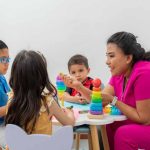Simple Words for Kids: Building a Strong Vocabulary
One of the most important aspects of a child’s early development is the formation of a robust vocabulary. A large vocabulary encourages comprehension, critical thinking, and originality in addition to improving communication abilities. As educators and parents, we have a big part to play in exposing kids to a wide variety of words and helping them build their vocabulary. We will look at basic and simple words that are appropriate for kids in this article. We can give kids the confidence to express themselves by using these words in regular conversations and activities. Let’s begin this fascinating exploration of language!
Simple Words for Kids
Words that are relatable and simple to understand are best introduced to young learners. A solid vocabulary growth foundation is built on simple terms. The following short terms will aid kids in growing their vocabulary:
Colours: Introduce red, blue, and yellow to kids as primary colours. Expand gradually to secondary colours like green, orange, and purple as they get to understand these primary hues. Make learning enjoyable and participatory by getting children involved in colour recognition games.
Teach kids the names of typical animals including dogs, cats, and birds. By exposing them to more unusual animals like elephants, giraffes, and tigers, you can broaden their knowledge. Encourage children to learn more about the traits and environments of many animals.
Body Parts: Introduce youngsters to physical features such as the head, eyes, nose, and hands. To help children remember, encourage toddlers to touch and point at various body parts. To make studying pleasurable, sing songs or perform games that require movement.
Food: Introduce common food terms like bread, apple, and banana. Talk about the significance of the various food groups in sustaining a healthy diet. Engage kids in meal planning and grocery shopping to improve their comprehension of various meals.
Vocabulary for Children
Introducing words that are applicable to children’s everyday life is one way to increase their vocabulary. The following word categories are crucial for kids:
Teach children words like “run,” “jump,” and “sleep” to explain actions. To improve their vocabulary and motor abilities, encourage kids to act out these actions. Make learning engaging by including action words in role-playing or narrative exercises.
Weather: Assist kids in comprehending terms like sunny, wet, and windy. Include weather conversations in normal activities to strengthen their comprehension. Discuss how various weather conditions affect activities and wardrobe choices.
Introduce fundamental mathematical ideas like numbering from one to 10. Introduce children to words like addition, subtraction, and multiplication as they gradually move on to greater numbers. Play games and activities that include counting with kids to help them learn about numbers.
Teach kids the names of their parents, siblings, and other family members. Talk about the relationships and roles inside the family. To help them connect more deeply with the world, encourage kids to tell tales or make art about their families.
Vocabulary Words for Kids
Introduce words that are a little more complicated but still simple to understand to children in order to encourage them to expand their vocabulary. The following list of vocabulary terms for children can aid in improving their language proficiency:
Teach kids the names of several types of transportation, including cars, buses, and trains. Talk about their functions and other forms of transportation, such as bicycles and aeroplanes. To increase kids’ understanding of transportation, take them on field excursions or let them watch instructional films.
Nature: Teach kids vocabulary like trees, flowers, and grass that are found in nature. Encourage them to explore their surroundings by taking them on nature strolls. Inform children about many species of plants, animals, and natural occurrences like rainbows and the changing of the seasons.
Emotions: Introduce emotional terminology, such as joyful, sad, and thrilled, to help kids communicate their emotions. Encourage them to express their emotions in a constructive way. To promote conversation, watch or read books that explore a range of emotions.
Teach kids terms with opposite connotations, such as big and little, hot and cold, or fast and slow. This will improve their comprehension of opposing ideas. To reinforce learning, play matching games or make flashcards with words that are opposite to one another.
Words for Kids to Learn
It’s crucial to periodically expose kids to new terms to broaden their vocabulary in order to support continual learning. Here are some strategies for teaching vocabulary to children:
Read aloud to kids from age-appropriate books that have a wide vocabulary. Encourage them to enquire about and clarify the meanings of new words. Make reading a habit at home by setting up a comfortable reading area.
Play word games like crosswords, charades, or word puzzles to make learning new words entertaining and participatory. Children will remain inspired and eager to learn as a result. Family game nights should include word games to encourage a love of language.
Introduce a new word to your child each day and talk to them about its definition and context in sentences. To use the word throughout the day in conversation, exhort them. Create a word jar and write down new words every day to choose from for conversation.
By employing unfamiliar words in natural circumstances, you can aid children in understanding what they mean. Introduce words like recipe, ingredients, and tools, for instance, when you’re cooking. Use routine tasks as a way to introduce new words and reaffirm understanding.
We may create a stimulating environment for kids to build a strong vocabulary by including these basic and simple terms in regular talks, activities, and play. Keep in mind to be patient, offer plenty of practice opportunities, and recognise their linguistic accomplishments. Children will benefit from having a large vocabulary throughout their lives. Start now and see how confident communicators become.
Consider EuroKids—a renowned early childhood education provider dedicated to holistic development—to discover other fascinating learning opportunities for your child. A supportive environment is provided by EuroKids so that kids can explore, learn, and develop.















